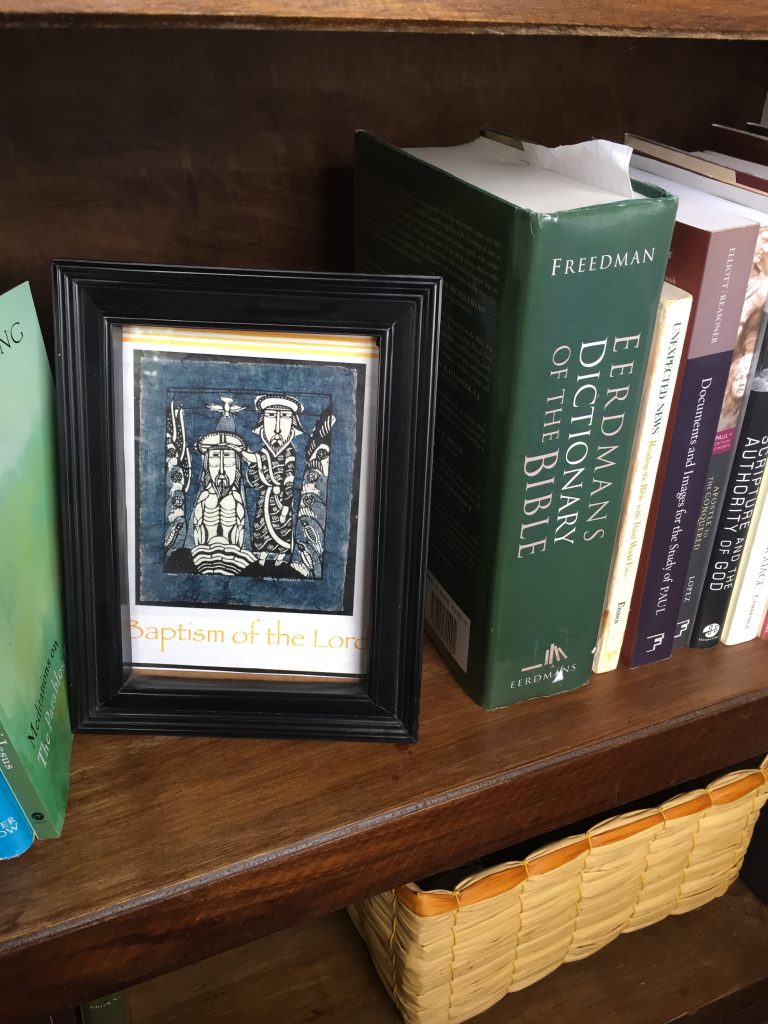words by chris
In our office at home I keep a framed image from a church bulletin of the baptism of Jesus. I think there are a variety of reasons why I am drawn more and more to the church’s traditional celebrations this time of year. Maybe it is because the high holy days and hustle and bustle of Christmas are over and Epiphany is like a little sigh before Lent and Easter. Maybe, in the northern climates, it is the promise of spring right about now. Maybe it is an attraction to something that is big in the Eastern church, but in the Catholic and Protestant West we have somehow forgotten its importance. It may be a bit deeper than that. I think it is the very nature of what we celebrate at Epiphany that I am drawn to.
 Epiphany is more like a series of vignettes into Christ’s human beginnings on earth. Whatever the tradition or length of season, the majority of the church marks this time by celebrating Jesus of Nazareth’s “revealing” or “manifestation” as God-among-us. It begins with the visit of strange astrologers, scholars and nobility from the unknown East. The outsiders recognizing the momentous occasion. Something a bit spectacular for a son of a laborer. We have the experience in which he gives his parents the slip and is sitting in with the discussion and debates with his elders. The irony of God humbly learning of Godself in the chosen tradition of God’s people. He grows in grace and wisdom. We see him baptized, identifying with us sinners and yet divinely affirmed as the Son of God. We then see the particularly interesting experience of performing a miracle because his mom tells him to. Also interestingly, it is one of the few miracle accounts that has no social consequence, other than everyone gets to party longer with better wine. The time of Epiphany concludes with Transfiguration, Jesus’ descent from the mountain and the movement toward Jerusalem into Lent.
Epiphany is more like a series of vignettes into Christ’s human beginnings on earth. Whatever the tradition or length of season, the majority of the church marks this time by celebrating Jesus of Nazareth’s “revealing” or “manifestation” as God-among-us. It begins with the visit of strange astrologers, scholars and nobility from the unknown East. The outsiders recognizing the momentous occasion. Something a bit spectacular for a son of a laborer. We have the experience in which he gives his parents the slip and is sitting in with the discussion and debates with his elders. The irony of God humbly learning of Godself in the chosen tradition of God’s people. He grows in grace and wisdom. We see him baptized, identifying with us sinners and yet divinely affirmed as the Son of God. We then see the particularly interesting experience of performing a miracle because his mom tells him to. Also interestingly, it is one of the few miracle accounts that has no social consequence, other than everyone gets to party longer with better wine. The time of Epiphany concludes with Transfiguration, Jesus’ descent from the mountain and the movement toward Jerusalem into Lent.
Reflecting on the nature of these vignettes that catch my attention, I am most drawn to the fact that the Divine just seems to wander in. The great revealing of “God with us” is wrapped up in Jesus of Nazareth going about being a seemingly typical pious Palestinian Jew in the first century. Whatever fanfare he might of received from the Wise Men is but just a moment and never really mentioned again. Mary keeps “treasuring these things” in her memory as if they might be forgotten. At the end, with the transfiguration, Jesus convinces Peter it is best for them to return down to the crowds and his dusty migratory work as a teacher and healer.
In Peter J. Gomes book of sermons he reflects on Epiphany and the growing-up and slow revealing of Christ in Luke 2.52. He notes that, “Jesus did not simply grow older, he grew wiser.” For us too it is a slow revealing of God in the world around us. As Jesus matured into the reality of what being Christ would mean, we need to grow in favour and wisdom in order to live into the great revelation of Christ’s life in our lives. Gomes goes on to say, “In other words, it is growing up as Christians that concerns us. For us as for Jesus these are often hidden years, but for us as well as for Jesus the process of spiritual maturity is the most important one in which we can engage, for it prepares us to accept his call and to serve in the world Jesus both served and saved.”
Perhaps that is why I am attracted to Epiphany, it is about that meandering hidden time. The text seems to be begging us to ask, “what was going on in between all these little episodes of Christ’s life?” In the instant gratification expectation we have today, even in religious life, the value of growth through time counteracts so much demand we lay on God. Again Rev. Gomes remarks that, “Time presents the opportunity for growth and too many people waste too much time waiting for epochal ‘mountaintop’ experiences as a stimulus to growth when there is so much work to be done in the valleys, where we spend most that time anyway.”
Perhaps that is the significance of the miracle of water into wine. Christ wishes to wander in and turn our ordinary water into sweet delicious wine, without fanfare, without being the center of attention, but to guide us into the joy of God with us.



Leave a Reply